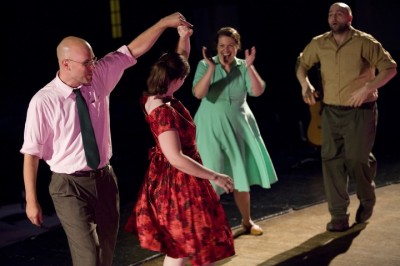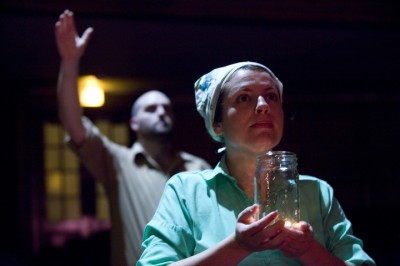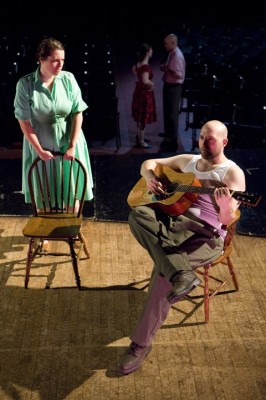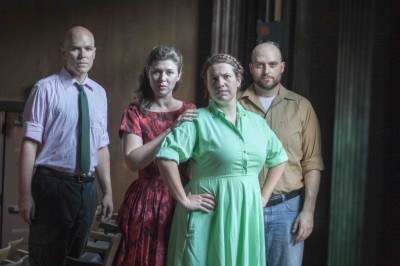Uptown Opera
Conceived by Annie Perry, Sergio Soltero & Libby Hladik
Original Music by Phil Maniaci
Starring Claire Biggers, Ali Delianides, Dennis Frymire & Pete Navis
Produced by Genesis Ensemble
Playing at Preston Bradley Auditorium
A forgotten bit of history in a sadly forgettable bluegrass opera…
From the end of the Second World War up until the mid-1960s, roughly 400,000 black Americans migrated to Chicago from the rural Deep South in search of blue-collar factory jobs. This massive shift in the nation’s demography reshaped the political landscape of major American cities for decades to come, in ways that are still palpable for many Chicagoans today.
But less known perhaps are the stories of other itinerant groups also making the journey north. For example, the increasing automatization of American coal production during the boom years of the post-WWII era (coupled with increased resistance toward unions) compelled nearly 70,000 poor Appalachian whites to come to Chicago as well. These ‘hillbillies’—as they were derisively called by the Chicago press—settled largely north of Fullerton Avenue with considerable numbers found throughout the Uptown area.
 Most of these families came from largely underdeveloped areas in the U.S.—areas which lagged behind the rest of the nation in terms of income, educational opportunity, and infrastructural development. Cultural clashes inevitably ensued between them and Chicago’s white establishment who tended to hold them in contempt as dirty, inbred criminals. For many of these mid-century migrants, life in Chicago was a constant uphill battle.
Most of these families came from largely underdeveloped areas in the U.S.—areas which lagged behind the rest of the nation in terms of income, educational opportunity, and infrastructural development. Cultural clashes inevitably ensued between them and Chicago’s white establishment who tended to hold them in contempt as dirty, inbred criminals. For many of these mid-century migrants, life in Chicago was a constant uphill battle.
Giving voice to their struggles is Genesis Ensemble, whose bluegrass/rockabilly Uptown Opera—now playing at the Preston Bradley Auditorium (fittingly, in Uptown)—admirably sets itself to the task of weaving together these somewhat forgotten threads of Chicago’s intricate social tapestry. Still, Uptown Opera’s big heart may not be enough to recommend itself, plagued as it is by a weak book and sadly underwhelming performances.
Indeed, the first thing one will notice about this story of 1957 Chicago’s Appalachian immigrants is the conspicuous absence of Chicago itself. Sister Sally (Claire Biggers) decides at the outset to leave her quaint life in West Virginia—driven not by economic necessity, but by the ‘big dream’ mystique of the Big City—and make the move to Chicago to live with her sister LulaJean (Ali Delianides) and her husband Carmi (Dennis Frymire).
But the struggles which follow—unemployment, alcoholism, family squabbling—have only a tangential relationship to the social, political and economic realities of Chicago itself, thus losing the rich specificity of its time and place. Uptown Opera might as well be set in Akron, Dayton, Cincinnati or Detroit for as much as it concerns itself with a world beyond the insularly familial.
The issues one would expect to define the Appalachian experience in post-WWII Chicago—i.e., working conditions in the city’s factories, race relations with both white natives and the newly transplanted black southern migrants, squalid tenement houses—are beyond the purview of Uptown Opera. Instead, it traffics in the selfsame cliched narratives Tribune reporter Norma Lee Browning would have used in one of her many screeds against the so-called ‘hillbilly problem’ back in the 1950s.
Its striking to observe that the only actual instance of xenophobic tribalism in Uptown Opera is found in the West-Virginian native Carmi, who resents Sally’s falling in love with the native boy, Curtis (Curtis McAllister), who is the least prejudiced character in the show. Then, as though taking a cue from Browning herself (or the Woman’s Christian Temperance Union), Carmi loses his job and takes to the bottle, leading him down the inevitable path of family abuse, drunken disorderly, and…well, you can guess the rest. Where we long for a story rich in detail, helping to unearth this forgotten piece of social history, we are instead presented with a rather poorly structured melodrama—over-generalized, prone to digression, and lacking in scope of vision.
native Carmi, who resents Sally’s falling in love with the native boy, Curtis (Curtis McAllister), who is the least prejudiced character in the show. Then, as though taking a cue from Browning herself (or the Woman’s Christian Temperance Union), Carmi loses his job and takes to the bottle, leading him down the inevitable path of family abuse, drunken disorderly, and…well, you can guess the rest. Where we long for a story rich in detail, helping to unearth this forgotten piece of social history, we are instead presented with a rather poorly structured melodrama—over-generalized, prone to digression, and lacking in scope of vision.
For its part, Phil Maniaci’s original music—which comprises 25 songs ranging from bluegrass to rockabilly to subtle hints of gospel—is expressive and succeeds in anchoring the show’s otherwise wayward tone and tenor. Dennis Frymire, for instance, shows some sizable crooning chops in the laid-back country song ‘Is This Home?’. And the tiny cast of four manage to blend nicely together for the second act’s elegiac choral rendition of ‘Freezin’ on the Water.’ But the tendency of Uptown Opera’s lyrics to rest too forcibly on the downbeat infuses the score with an oddly metronomic regularity. Which might be redeemable were they intricate or revealing. Unfortunately, they’re of the “She’s so fine/ I need to make her mine”-variety, including a head-banging attempt to rhyme ‘mate’ with ‘conversate.’
None of this is much aided by the fact that Uptown Opera’s music is pre-recorded (including backup vocals). As each track barrels onward, it’s clear that the performers can’t always hear the accompaniment. On more than one occasion, they struggle to keep both in time and on pitch. When live performers are accompanied by live musicians, there’s a sense of give and take. Of compromise and mutuality. When music is canned, actors look as though they’re being dragged across the stage like inert mops, trying to hear music which can’t, in turn, hear them.
 The audience is sat in the choir seats onstage, facing out to overlook Preston Bradley’s 960-seat auditorium. Director Annie Perry deserves credit for making imaginal good use of the space’s multi-tiered seating, but at the end of the day, its immense sublimity tends to overwhelm the action of this small-scaled chamber opera—to say nothing of exhausting the actors, who dash madly back and forth up the theater aisles, trying to perch themselves in the mezzanine before scaling the rafters to get back down again. Still, Annie Perry’s staging is innovative and economical, relying heavily on pantomimed actions (though not all of them are as clear and focused as we might want them to be).
The audience is sat in the choir seats onstage, facing out to overlook Preston Bradley’s 960-seat auditorium. Director Annie Perry deserves credit for making imaginal good use of the space’s multi-tiered seating, but at the end of the day, its immense sublimity tends to overwhelm the action of this small-scaled chamber opera—to say nothing of exhausting the actors, who dash madly back and forth up the theater aisles, trying to perch themselves in the mezzanine before scaling the rafters to get back down again. Still, Annie Perry’s staging is innovative and economical, relying heavily on pantomimed actions (though not all of them are as clear and focused as we might want them to be).
Performances, on the whole, vary from person to person and from moment to moment. Peter Navis as the ‘city boy’ Curtis isn’t much of a vocalist or a dancer, and he has a tendency to cross the stage on bended knee with his thumbs placed awkwardly in his pockets. Claire Biggers feels more physically relaxed and is likable enough (or at least inoffensive enough), though her occasionally mousey vocalizations don’t always reach us, especially from way back in the nosebleed seats of the auditorium. But Ali Delianides is a relatively strong vocalist and her unflagging energy and good humor situate her as Uptown Opera’s emotional touchstone. Similarly, Dennis Frymire has a beautiful singing voice, one sadly underutilized in this production.
By the 1960s, the dream was coming to an end. The deindustrialization of American cities and increased opportunities in the ‘New South’ with cheaper standards of living returned many of the Appalachian migrants back to their home states. Over time, their stories started to fade from memory. Unfortunately, Uptown Opera seems destined to join them.
NOT RECOMMENDED
Reviewed by Anthony J. Mangini
Uptown Opera runs until August 19th, 2013. Preston Bradley Auditorium is located at 941 W. Lawrence Ave.

